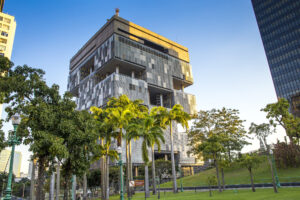
(Petrobras, 26.Oct.2023) — In 3Q23, average production of oil, NGL and natural gas reached 2.88 MMboed, 9.1% higher than in 2Q23, mainly due to the better operational performance of the pre-salt platforms and the lower losses with stoppages and maintenance, besides the ramp-up of platforms P-71 in the Itapu field, FPSO Almirante Barroso in the Búzios field and FPSO Anna Nery in the Marlim field. The start-up of FPSO Anita Garibaldi in the Marlim and Voador fields and the start-up of new wells in complementary projects in Campos and Santos Basins also contributed to the 3Q23 performance. These effects were partially offset by the natural decline of mature fields and divestments.
Production in pre-salt reached a new quarterly record of 2.25 MMboed, equivalent to 78% of Petrobras total production, surpassing the previous record of 2.06 MMboed in 2Q23. Total operated production by Petrobras also reached a record with 3.98 MMboed in the same period, 7.8% above 2Q23.
On August 16, FPSO Anita Garibaldi in Campos Basin, the second unit in the Marlim and Voador fields revitalization project to start up, produced its first oil. The FPSO has the capacity to produce up to 80 Mbpd of oil and process 7 MMm3 of natural gas per day, and will operate simultaneously in the post-salt and pre-salt of the aforementioned fields.
FPSO Sepetiba arrived in Brazil in early September to be installed in the Mero field, in Santos Basin pre-salt. The platform is already at its final location, and mooring and connection activities are currently underway. This will be the second definitive system out of four to be installed in the Mero field and it will have the capacity to produce 180 Mbpd of oil and 12 MMm3/d of gas. The FPSO is equipped with innovative technologies that combine increased efficiency and reduced greenhouse gas emissions, including CCUS (Carbon Capture, Utilization and Storage), which involves reinjecting CO2-rich gas into the reservoir, reducing emissions to the atmosphere. The unit is expected to start up in 4Q23.
On October 24, FPSO Almirante Barroso reached the project’s nominal capacity of 150,000 bpd, with 3 producing wells, just 4.7 months after the first oil, a record in the pre-salt. The previous record was held by FPSO P-76, operating in the Búzios field, which had reached its nominal capacity in 7.7 months. “Búzios is the largest deepwater field in the world. The achievement of the record shows the high productivity of the wells in the field, and the asset also stands out for its low level of emissions, its substantial reserves and the high quality of the oil produced”, said Exploration and Production Director Joelson Mendes.
The utilization factor of Petrobras refining facilities reached 96% in 3Q23, the highest quarterly figure since 2014. This high utilization level made it possible to meet demand with reliability and operational availability, reaching total production of oil products of 1,829 Mbpd in 3Q23. The production of diesel, gasoline and jet fuel represented 69% of total production, an increase of 2 p.p. compared to 2Q23. “The optimization of our processes is allowing us to increase production in our facilities and the supply of products to the domestic market with profitability”, commented the Director of Industrial Processes and Products, William França.
Sales of S-10 diesel in 3Q23 represented 62% of diesel sales, setting a new record with 496 Mbpd. Along with sales, S-10 diesel production reached a record of 464 Mbpd in 3Q23, the result of actions to optimize production processes and investments.
We highlight in the period the completion of the adaptation of REDUC HDT, the first completed project of the so-called S-500 diesel phase-out, which will gradually replace Petrobras road diesel production with S-10 diesel. This project adjusted production capacity by 28 Mbpd of S-10 diesel, almost double the previous potential to supply this fuel at REDUC, meeting market demands as well as environmental requirements.
We strengthened the energy transition with more efficient use of energy consumption and reduced greenhouse gas emissions, achieving the best quarterly results of the refineries in Energy Intensity (101.7) and Greenhouse Gas Emission Intensity (36.2 kgCO2eq/CWT), the result of the constant operational focus on energy performance and investments in the RefTOP Program (World Class Refining). Also noteworthy in July was the start-up of the electrostatic precipitator project at REFAP, which prevents the emission of around 30 tons/month of fine particulates into the environment.
In September, the gas processing units at Caraguatatuba and Cabiúnas reached the highest monthly figure in history for pre-salt gas processing. There were 28.96 million m³/d of gas offloaded through Routes 1 and 2, surpassing the previous record of 27.27 million m³/d achieved in March 2022.
____________________

